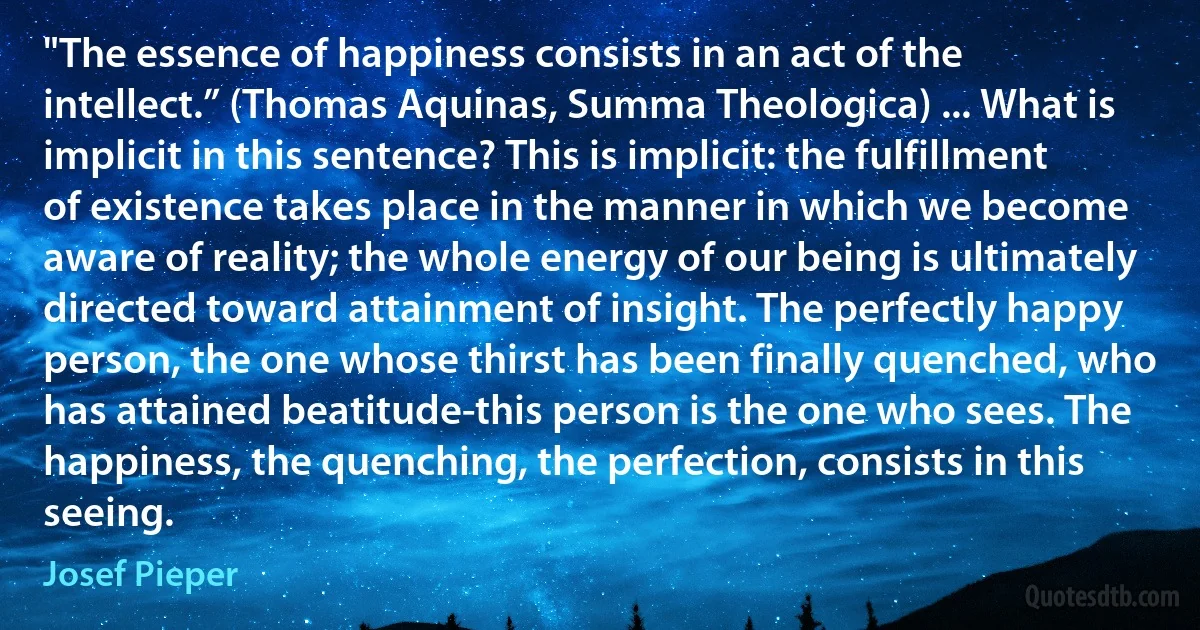Act Quotes - page 100
In real life, too, it takes a long time for a woman to bring the animus into consciousness, and it costs her a great deal of suffering. But if she succeeds in freeing herself from his possession, he changes into an "inner companion" of the highest value, who confers on her positive masculine qualities such as initiative, courage, objectivity, and intellectual clarity. Like the anima in a man, the animus also commonly exhibits four stages of development. In the first stage he manifests as a symbol of physical force, for example, a sports hero. In the next stage, in addition he possesses initiative and focused ability to act. In the third stage, he becomes "the word" and is therefore frequently projected onto noteworthy intellectuals, like doctors, ministers, and professors.

Marie-Louise von Franz
See here, if a simple act of kindness or generosity, such as buying a loaf of bread for some poor working women, can mean that wholesale death and destruction will be avoided - why, a man would be a monster who had it in his power to alleviate all that suffering yet stood by and did nothing.

Stephen R. Lawhead
Despite the potential to lead us to new cures, the federal government has restricted funding for creating new cell lines – putting the burden of any future research squarely on the shoulders of the private sector. The consequences of this decision have not only driven thousands of scientists overseas in search of more money and greater opportunity – but also put the brakes on the march of medicine. I've always wondered how these legislators would act if their health – or their children's health – was on the line and stem cell research might lead to a cure.

Michael Bloomberg
What demon is our god? What name subsumes
That act external to our sleeping selves?
Not pleasure - it is much too broad and narrow, -
Not sex, not for the moment love, but pride,
And not in prowess, but pride undefined,
Autonomous in its unthought demands,
A bit of vanity, but mostly pride.

J. V. Cunningham
A curious paradox: people have only the narrowest private interest in mind when they act, yet they are at the same time more than ever determined in their behavior by the instincts of the mass. ... The diversity of individual goals is immaterial in face of the identity of the determining forces.

Walter Benjamin
What happens when our eye sees a rose? What do we do when that happens? Our mind does something, to be sure, in the mere fact of taking in the object, grasping its color, its shape, and so on. We have to be awake and active. But all the same, it is a "relaxed" looking, so long as we are merely looking at it and not observing or studying it, counting or measuring its various features. Such observation would not be a "relaxed" action; it would be what Ernst Jünger termed an "act of aggression." But simply looking at something, gazing at it, "taking it in," is merely to open our eyes to receive the things that present themselves to us, that come to us without any need for "effort" on our part to "possess" them.

Josef Pieper
But I know for a fact that had I had a father, I'd have some discipline. I'd have more confidence. Your mother cannot calm you down the way a man can. Your mother can't reassure you the way a man can. My mother couldn't show me where my manhood was. You need a man to teach you how to be a man. When I was young I was quiet, withdrawn. I read a lot, wrote poetry, kept a diary. I watched TV all day. I stayed in front of the television. It was when I was in front of the TV by myself, being alone in the house by myself, having to cook dinner by myself, eat by myself. Just being by myself and looking at TV, at families and all these people out there in this pretend world. I knew I could be part of it if I pretended too, So early on I just watched and emulated ... and I just thirsted for that. I thought if I could be and act like those characters, act like those people, I could have some of their joy. If I could act like I had a big family I wouldn't feel as lonely.

Tupac Shakur
And as for the close connection between philosophy and poetry, we can refer to a little-known statement by Thomas Aquinas in his Commentary on Aristotle's Metaphysics [I, 3]: the Philosopher is akin to the Poet in this, that both are concerned with the mirandum, the "wondrous," the astonishing, or whatever calls for astonishment or wonder. This statement is not that easy to fathom, since Thomas, like Aristotle, was a very sober thinker, completely opposed to any Romantic confusion of properly distinct realms. But on the basis of their common orientation towards the "wonderful" (the mirandum - something not to be found in the world of work!) - on this basis, then, of this common transcending-power, the philosophical act is related to the "wonderful," is in fact more closely related to it than to the exact, special sciences; to this point we shall return.

Josef Pieper
To philosophize (we have already asked, What empowers the philosophical act to transcend the working-world?) - to philosophize means to take a step outside of the work-a-day world into the vis-à-vis de l'univers. It is a step which leads to a kind of "homeless"-ness: the stars are no roof over the head. It is a step, however, that constantly keeps open its own retreat, for the human being cannot live long in this way.

Josef Pieper
Stirner's political praxis is quixotic. It accepts the established hierarchies of constraint as given. ... Not liable to any radical change, they constitute part of the theatre housing the individual's action. ... The egoist uses the elements of the social structure as props in his self-expressive act.

John Carroll
In reading about all these answers to prayer, the believing reader may be led to think that I am spiritually minded above most of the children of God, and that, therefore, the Lord favours us thus. The true reason is this. Just in as many points as we are acting according to the mind of God, in so many are we blessed and made a blessing. Our manner of living is according to the mind of the Lord, for He delights in seeing His children thus come to Him (Matt. vi.); and therefore, though I am weak and erring in many points, yet He blesses me in this particular, and, I doubt not, will bless me, as long as He shall enable me to act according to His will in this matter.

George Müller
It was only after the consideration of many months, and after much self-examination as to my motives, and after much earnest prayer, that I came to the conclusion to write this little work. I have not taken one single step in the Lord's service, concerning which I have prayed so much. My great dislike to increasing the number of religious books would, in itself, have been sufficient to have kept me for ever from it, had I not cherished the hope of being instrumental in this way to lead some of my brethren to value the Holy Scriptures more, and to judge by the standard of the word of God the principles on which they act.

George Müller
There is never a time when a president can act to stop a tragedy from occurring without being held politically accountable one way or the other. If he does it and fails, he's wrong. If he does it and succeeds, he was never right because it didn't happen. If we go in and stop an act of genocide, we can't prove what we stopped.

Joe Biden



